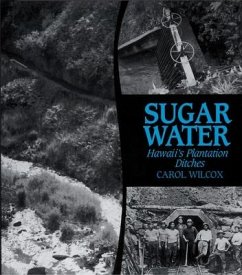Hawaii's sugar industry enjoyed great success for most of the 20th century, and its influence was felt across a broad spectrum: economics, politics, the environment, and society. This success was made possible, in part, through the liberal use of Hawaii's natural resources. Chief among these was water, which was needed in enormous quantities to grow and process sugarcane. Between 1856 and 1920, sugar planters built miles of ditches, diverting water from almost every watershed in Hawaii. "Ditch" is a humble term for these great waterways. By 1920, ditches, tunnels, and flumes were diverting over 800 million gallons a day from streams and mountains to the canefields and their mills. Sugar Water chronicles the building of Hawaii's ditches, the men who conceived, engineered, and constructed them, and the sugar plantations and water companies that ran them. It explains how traditional Hawaiian water rights and practices were affected by Western ways and how sugar economics transformed Hawaii from an insular, agrarian, and debt-ridden society into one of the most cosmopolitan and prosperous in the Pacific.
Hinweis: Dieser Artikel kann nur an eine deutsche Lieferadresse ausgeliefert werden.
Hinweis: Dieser Artikel kann nur an eine deutsche Lieferadresse ausgeliefert werden.








